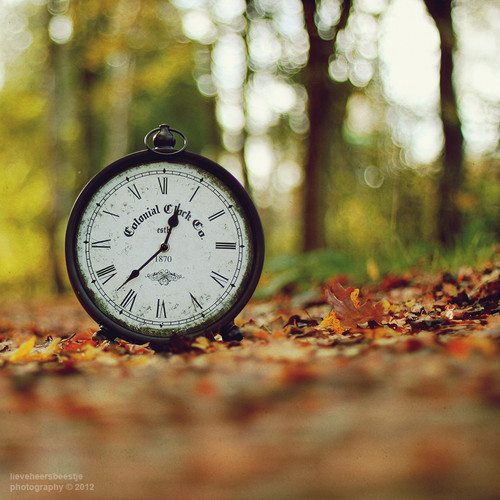當前位置: Language Tips> 合作專區> 英語學習專欄
分享到
前路不論是磨難,還是平坦;境遇不論是凄切,抑或幸福;時光只管一路向前……所有的煩惱都會過去,猶如沙漏之憂,流水之愁。但令人憂傷的是:所有的美好也同樣會逝去,無法挽留。

By Emma D.
高琦 選注
I’m an old person in a young person’s body. Change exhausts me. I like routine. The simple motions of a school day were always calming to me—the same classes, the same people, the same hours spent in a predictable pattern. I eat dinner at the same time every day and never stay up past 11. When I was in school I preferred scheduled, predictable activities like drama club and choir to on-the-fly, anything-can-happen parties.
When my plans change suddenly, it feels like gears grinding in my brain. Instead of rolling along with my routine, everything in my head seems to jam while I erase everything I had planned for the day—dinner, homework, television—and replace it with my new plans. It doesn’t matter if the new plan is better than the old—having to quickly rebuild my mental schedule almost physically hurts. My brother once made a last-minute decision to visit our parents (who live five hours away) and gave me an hour’s notice to decide if I wanted to go with him, and I burst into tears. I eventually gave in, which led to a very nice weekend. I like my family, but I need a couple of days to psych myself up for such a big change.
I know that no matter how hard I try, I can’t prevent things from changing. The school year ends, people move, friendships fade. But I get so attached to the familiar that even positive changes have been difficult for me to accept. Every new school year or college semester meant exciting new classes, but also the absence of my former classes and classmates, which felt unbearably sad. A relative getting married or having a child meant a happy new addition to our family, but also meant that every holiday gathering was now going to be different, so I’d have to mourn the end of an old era and adjust to something new. I even sniffled a little over getting my braces removed (in all fairness, we’d been together for five years).
I kept the same close friends, a core group of five people, all through middle school and into high school. We called each other’s parents Mom and Dad, spoke entirely in inside jokes , and were even writing a series of novels together. After our years of shared memories, I was sure we’d be best friends forever. But during sophomore year, one of the girls in our group suddenly backstabbed another without provocation. And just like that, our tight-knit group unraveled. I had no desire to keep the backstabber in my life, but I missed the happiness of our former group, and I mourned the loss of the friend she used to be. Now there was tension and bad feelings even when she wasn’t around, and we all knew that the five of us would never willingly be in the same room together again.
My life had been incredibly stable up until this point, which could possibly help explain my neurosis about change. I’d never experienced real loss, trauma, or drama, and so I’d grown to see any change to the status quo as a threat. But now I had a taste of the truth, and it terrified me. If my longest, closest friendships could be broken, then nothing was safe. There was nothing I could count on.
But this experience is how I learnt that basically, everyone suffers, and the reason for that is that we’re too attached to things, people, outcomes , ideas. I got sad when my friend group splintered because I was attached to my friends. I don’t like change because I’m attached to my routines.
One concept that really jumped out at me was the idea of impermanence . It’s basically like that saying “this too shall pass”: Usually you hear it when you’re going through a rough time—you’re upset over a breakup or a difficult class or an illness, and your grandmother sends you some beautiful card telling you to cheer up, this will pass. And that’s a good thought. The bad things will pass.
But here’s the catch: So will the good things. This is why you’re supposed to let go of your attachments. Because your pain over your breakup will pass, but so will that exciting new-love feeling when you start a new relationship. I was attached to my routine, my day-to-day existence of friends, classes, and family, but that comfortable existence was going to pass, and my not accepting that was responsible for a large portion of my anxiety.
If I wanted to become comfortable with change, I had to learn to live in the moment. I had to accept that life was good right now, but that it was not permanent. When you learn to accept ahead of time that an end will come, the end is less painful.
Now, I still cling to routine. But these days I’m better at rolling with change. When my college roommate/best friend left to spend her last semester on an out-of-state internship, while I mourned the end of our life together, I also found myself kind of excited about the new experience of living alone. It turns out it’s kind of lonely. But this too shall pass.
(來源:英語學習雜志 編輯:丹妮)
分享到
關注和訂閱


電話:8610-84883645
傳真:8610-84883500
Email: languagetips@chinadaily.com.cn